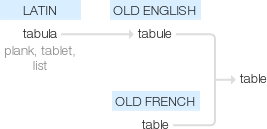Table
Old English tabule ‘flat slab, inscribed tablet’, from Latin tabula ‘plank, tablet, list’, reinforced in Middle English by Old French table .
wiktionary
From Middle English table, tabel, tabil, tabul, from Old English tabele, tabul, tablu, tabule, tabula(“board”); also as tæfl, tæfel, an early Germanic borrowing of Latin tabula(“tablet, board, plank, chart”). The sense of “piece of furniture with the flat top and legs” is from Old French table, of same Latin origin; Old English used bēod or bord instead for this meaning: see board. Doublet of tabula.
etymonline
table (n.)
late 12c., "board, slab, plate," from Old French table "board, square panel, plank; writing table; picture; food, fare" (11c.), and late Old English tabele "writing tablet, gaming table," from Germanic *tabal (source also of Dutch tafel, Danish tavle, Old High German zabel "board, plank," German Tafel). Both the French and Germanic words are from Latin tabula "a board, plank; writing table; list, schedule; picture, painted panel," originally "small flat slab or piece" usually for inscriptions or for games (source also of Spanish tabla, Italian tavola), of uncertain origin, related to Umbrian tafle "on the board."
The sense of "piece of furniture with the flat top and legs" first recorded c. 1300 (the usual Latin word for this was mensa (see mensa); Old English writers used bord (see board (n.1)). Especially the table at which people eat, hence "food placed upon a table" (c. 1400 in English). The meaning "arrangement of numbers or other figures on a tabular surface for convenience" is recorded from late 14c. (as in table of contents, mid-15c.).
Figurative phrase turn the tables (1630s) is from backgammon (in Old and Middle English the game was called tables). Table talk "familiar conversation around a table" is attested from 1560s, translating Latin colloquia mensalis. Table manners is from 1824. Table-hopping is recorded by 1943. The adjectival phrase under-the-table "hidden from view" is recorded from 1949; to be under the table "passed out from excess drinking" is recorded from 1913. Table tennis "ping-pong" is recorded from 1887. Table-rapping in spiritualism, supposedly an effect of supernatural powers, is from 1853.
table (v.)
mid-15c., "enter into a list, form into a list or catalogue," also "provide with food," from table (n.). In parliamentary sense, 1718, originally "to lay on the (speaker's) table for discussion;" but in U.S. political jargon it has chiefly the sense of "to postpone indefinitely" (1866) via notion of "lay aside for future consideration." Related: Tabled; tabling.
